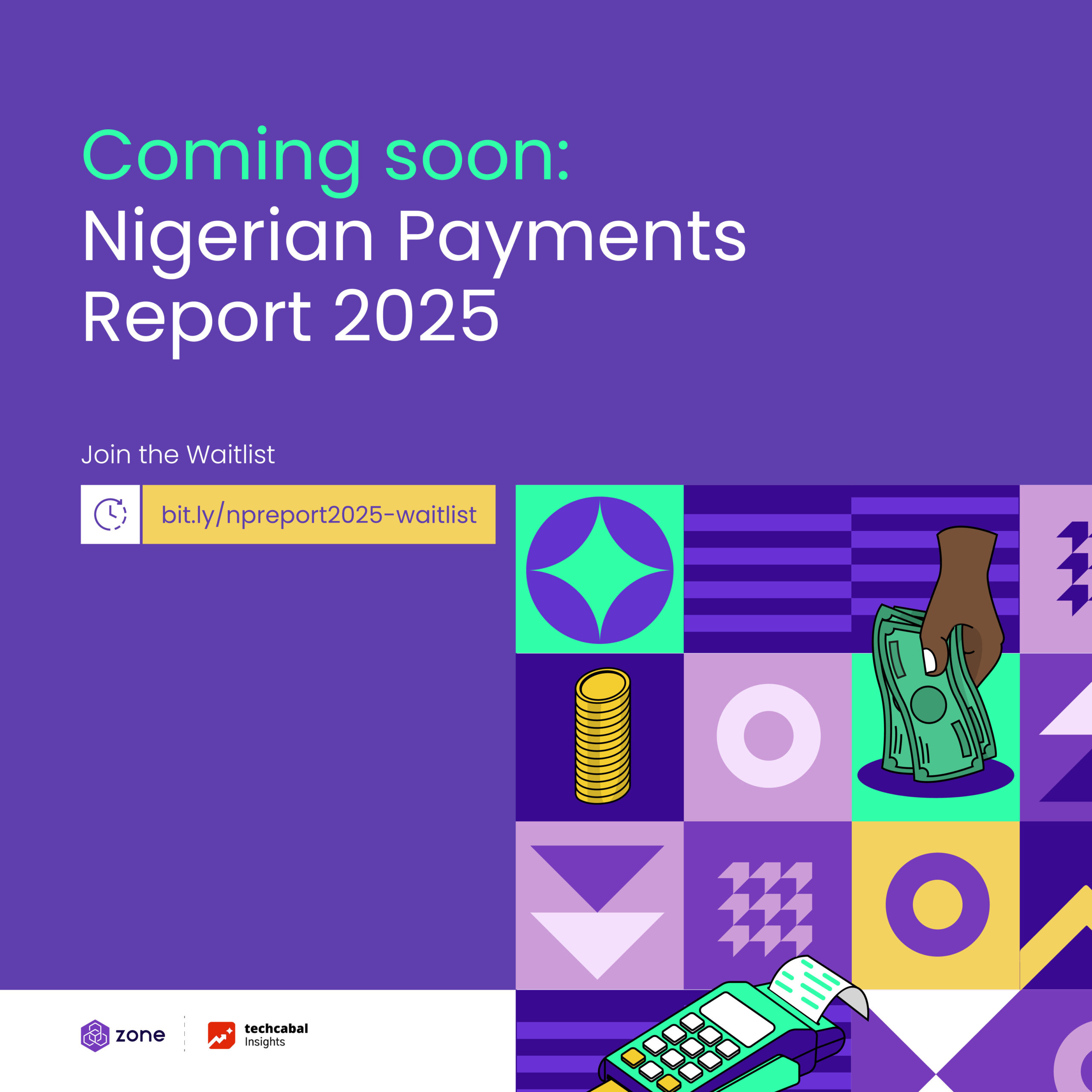- 👨🏿🚀TC Daily
- Posts
- Delete our data
Delete our data
Inside: African startups raised $343 million in April.


Happy pre-TGIF. ☀️️️
Remember thinking your 20s were the peak of happiness?
Turns out, you’ve been selling your future self short. New research shows that aging, happiness, and well-being don’t just bounce back after midlife; they keep climbing well into your 70s. Your 30s will probably feel better than your 20s, your 40s even better than that, and so on. Forget the midlife crisis myth; life satisfaction is more of a steady uphill climb than a U-shaped rollercoaster.
So next time you dread another birthday, remember: you’re not just getting older, you’re leveling up in happiness.
– Faith

Funding
African startups raised $343 million in April, driven by exits and mega deals

Africa’s startup ecosystem saw a strong rebound in April 2025, with 39 startups raising a total of $343 million across equity deals above $100,000, including debt and grants, according to data from Africa: The Big Deal. This marks a sharp recovery from March’s funding dip and makes it the second-highest April on record for tech funding on the continent, trailing only the April 2022 surge.
The surge was fueled by a few standout mega deals.
The big hitters: South African healthtech startup hearX led the charge, securing $100 million through a merger with US-based Eargo. Egypt’s Islamic fintech Bokra raised approximately $59 million via a sukuk issuance, one of the largest Sharia-compliant fundraising rounds in the region. Meanwhile, South African payments infrastructure startup Stitch pulled in $55 million from existing investors as it ramps up efforts to offer end-to-end payment solutions across Africa.
April’s surge brings total funding for African startups to $803 million across 163 ventures in the first four months of 2025—up 43% from the $563 million raised by 147 startups during the same period in 2024. After a sluggish January, this rebound signals renewed investor confidence and a strengthening appetite for African innovation.
In April, over four exits were recorded, mostly involving fintechs. These exits underscore a maturing African tech ecosystem that not only builds strategic value but also attracts cross-border investor interest, reassuring stakeholders about the continent's return potential.
Egypt’s ADVA was acquired by UAE-based Maseera; Nigeria’s Bankly was bought by C-One Ventures; and South Africa’s Peach Payments snapped up Senegalese fintech PayDunya to enter Francophone West Africa. These exits, spread across North, West, and Southern Africa, not only signal pan-African consolidation but also validate investor confidence in strategic acquisitions as a pathway to scale.
Together, these exits complement April’s $343 million funding surge, reinforcing investor confidence in Africa’s tech ecosystem. They reflect a growing appetite for sustainable growth, strategic expansion, and ultimately, the return potential that has long underpinned the continent’s innovation story.
Seamless Global Payments With Fincra.

Issue accounts in NGN, KES, EUR, USD & more with one integration. Send & receive funds seamlessly across borders; no more banking hassles or complex conversions. Create an account for free & go global today.
Cryptocurrency
Kenyan high court orders WorldCoin to delete biometric data of Kenyans

The Kenyan High Court has dealt WorldCoin a blow that lands straight in the retina.
On Wednesday, the court sided with Kenyan regulators, ruling that WorldCoin—the crypto startup backed by OpenAI’s Sam Altman—is not compliant with local data protection laws. The court found that consumer consent wasn’t freely given, labelling the startup’s methods coercive, exploitative, and incompatible with Kenya’s legal standards.
Once a frenzy in Kenya, WorldCoin has faced scrutiny since entering the country in 2023. The project offered utility tokens, $WLD—which could be exchanged for real cash—in return for scanning people's retinas on “orbs” that stored and converted users’ biometric data as hashes. WorldCoin wants to build a large human database.
For many Kenyans, the technical details didn't matter. They needed the money. People flocked to shopping malls for the 25 WLD tokens, then worth nearly $50 (1 WLD = $0.9174 today). At its peak, over 300,000 Kenyans had signed up. They traded the tokens on crypto exchanges or via peer-to-peer (P2P) means—some falling victim to scams.
In August 2023, Kenyan regulators suspended WorldCoin from operating, citing improper data practices and lack of a proper licence. Yet, TechCabal checks at the time found that WorldCoin’s parent company, Tools for Humanity, was licenced by the Office of the Data Protection Commissioner (ODPC). Following a Directorate of Criminal Investigations (DCI) report, operations resumed conditionally in 2024.
But its legality has been widely contested by regulators, leading to a prolonged court process. Now, checks show that neither WorldCoin nor Tools for Humanity is cleared to operate in Kenya—adding to a growing list of countries like Germany and Indonesia where the project is banned.
With this ruling, WorldCoin must delete Kenyans’ data or face sanctions. An appeal is possible, but regulators aren't likely to budge. Additionally, Kenya is pushing to regulate crypto; this will provide a stronger framework and set a precedent for engaging with highly sensitive data projects like WorldCoin.
Power Your Business With Paga Engine

Join businesses already building smarter with Paga Engine. Get started today.
Ride-hailing
inDrive can now provide user data to South African Law enforcement

One inDrive ride in Cape Town, and the Makgata (police) can get your info!
inDrive has launched a Law Enforcement Request Portal in South Africa that allows verified personnel to request user data for public safety and law enforcement purposes. The ridesharing app stated that this initiative is part of their commitment to safety, transparency, and joining forces with the country’s authorities.
You must be wondering, can inDrive really do that? What about South Africa’s Protection of Personal Information Act (POPIA) system?
The POPIA: The POPI Act enforces your constitutional right to privacy by safeguarding your personal information when it is processed by a responsible party, including the manner and conditions in which such information can be processed.
While it is still unclear about how compliant this new system is with the Act especially in terms of user consent and data retention, inDrive explained that the information they would provide is intended strictly for safety purposes and may not be shared with third parties. That sigh of relief? It’s fair.
Around the continent, data privacy issues continue to stir concerns, with people questioning where the line between security and privacy should be drawn. In Nigeria, the Lagos State government and a ride-hailing platform, Uber, were caught in a showdown over data sharing. Both parties had agreed to grant access to user trip and location data for planning and security purposes in 2024. This tussle came in 2024 , after the government demanded real-time access to trip details, threatening sanctions for non-compliance. After a month-long battle, and a lot of impounded vehicles, they reached a truce.
This move by inDrive could trigger other ride-hailing platforms like Bolt and Uber to make similar changes concerning user data. But let’s be real: How comfortable are you with law enforcement accessing your personal data—whenever they need it—if it’s for the sake of national safety?
Never miss an update from Paystack

Subscribe to Paystack for a curated dose of product updates, insights, event invites and more. Subscribe here →
Economy
Ghana's inflation eases to 21.2% in April after its Cedi currency gained against the dollar

Ghana’s inflation eased by 120 basis points to 21.2% in April 2025—its lowest level in eight months—thanks largely to a remarkable comeback by its currency, cedi. Bloomberg reported that the currency has strengthened by nearly 16% against the dollar since the start of April, cutting the cost of imports from fuel to food and giving households some breathing space.
The stronger currency helped reduce Ghana’s trade deficit; this took pressure off everyday prices like fuel, food, and manufactured goods, thereby easing inflation. In a region where currency meltdowns are more common than rallies, Ghana’s story is a rare bright spot.
Behind the relief are tough choices. In March 2025, the Bank of Ghana (BoG) raised its benchmark rate to a steep 28% and pulled back liquidity to cool demand. The government, under pressure from both voters and the International Monetary Fund (IMF), also tightened spending, dropped unpopular taxes, and backed local food production to trim its import bill.
This blend of tight money, tighter budgets, and a timely harvest has slowed both food and non-food inflation. Yet, inflation remains more than double the central bank’s target. Electricity tariff hikes and global oil price swings could stir things up again. And while rate cuts may be on the table later this year—from analysts’ predictions—the BoG isn’t ready to blink just yet.
What matters here isn’t just the headline number—it’s the direction and discipline. Ghana is trying to rebuild market confidence after a bruising debt crisis. The recent disinflation shows policy is working, at least for now. Sustaining it will take staying the course, even when the political pressure to ease kicks in.
Post Jobs on Jobberman for Free!

Hiring just got easier! Post your jobs on Jobberman for FREE and connect with 3 million+ qualified candidates. No fees, no stress - just smart, seamless recruitment. Start here.
CRYPTO TRACKER
The World Wide Web3
Source:

Coin Name | Current Value | Day | Month |
|---|---|---|---|
| $99,047 | + 2.61% | + 23.64% | |
| $1,896 | + 3.77% | + 18.72% | |
| $0.8284 | + 19.34% | + 9.55% | |
| $150.00 | + 3.33% | + 35.18% |
* Data as of 06.15 AM WAT, May 8, 2025.
Events
- The Lagos Startup Expo returns on June 18–19, 2025, at Landmark Centre, Victoria Island, with the theme “Connect, Invest and Innovate.” This year’s edition will host over 200 startups across fintech, healthtech, AI, and more, offering live demos, founder meetups, and networking with investors. Open to the public, the expo features regular and VIP passes—with VIPs gaining access to expert-led masterclasses and investor lounges. Register to exhibit at the Expo here.
- FrontendLabs is hosting its first-ever Tech Leadership Mixer on May 16, 2025, in Lagos to tackle Africa’s talent–execution gap. The invite-only event will bring together founders, CTOs, HR leaders, and innovators for a day of deep dives into scaling engineering teams, hiring for growth, and building strong product cultures. Attendees will also take part in small-group product clinics to solve real-world challenges, with expert facilitation from FEL. TechCabal will cover the event live. Reserve your seats.


Be the First to Access the Nigerian Payments Report 2025

The Nigerian Payments Report 2025 dives into the trends, challenges, and innovations shaping the future of digital payments. Join the waitlist today to get early access to the report when it goes live! Join the waitlist

Written by: Abubakar Abdurasheed, Emmanuel Nwosu, and Opeyemi Kareem
Edited by: Faith Omoniyi
Want more of TechCabal?
Sign up for our insightful newsletters on the business and economy of tech in Africa.
- The Next Wave: futuristic analysis of the business of tech in Africa.
- TC Scoops: breaking news from TechCabal
P:S If you’re often missing TC Daily in your inbox, check your Promotions folder and move any edition of TC Daily from “Promotions” to your “Main” or “Primary” folder and TC Daily will always come to you.

How did you find today's edition of #TCDaily? |


